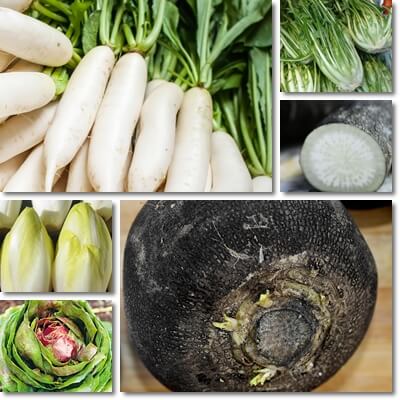They say it’s always good to eat what’s in season because seasonal fruits and vegetables have the most benefits for health. But when it comes to foods in season in winter, there somehow never seem to be any good options. However, there are plenty of seasonal winter fruits and vegetables to eat that are also full of benefits for health. Discover 8 healthy winter foods to detox with, and their benefits for health!
Kiwifruit For Detox
Kiwifruit is actually in season all year round, but also a key winter fruit with important benefits for health. Kiwifruit is naturally high in vitamin C. Vitamin C is known to lower high cholesterol and prevent plaque buildup on the inside of artery walls, and has an antioxidant, antiaging, anti-inflammatory and regenerative action. In very high amounts, vitamin C has laxative properties as well. Also, the seeds of kiwifruit actively fight constipation, helping kickstart transit and stimulating bowel evacuation.

Chicories
Right about now, chicories are in full season. What are chicories? Chicories are varieties of leafy vegetables in season late fall through winter and well into spring. They are typically consumed raw, in salads, and are crisp, with a pleasant, mild to moderate bitter taste. The best types of chicory salads to eat this time of the year include:
- Escarole or broad-leaved endive (a dark green lettuce-like salad with large leaves)
- Curly endive or endive frisee (a curly lettuce-like salad)
- Catalogna chicory, puntarelle or asparagus endive (has thick, meaty white stems and green leaves)
- Italian chicory or radicchio (looks like a smaller magenta cabbage with white veins)
- Belgian endive (a small, elongated head of tightly packed cream-colored to light yellowish-green leaves)
Chicories are one of the best salads to eat in winter. They provide good amounts of dietary fiber and have laxative effects, helping purge the digestive system and restore bowel movement regularity. Raw chicories are good sources of vitamin C which has a cleansing action, and lowers levels of inflammation in the body. Studies show vitamin C lowers levels of C-reactive protein and supports the immune system.
Because of their mild to moderate bitter taste, chicories act as a digestif, aiding digestion along, with benefits for bile production. The winter salads provide good amounts of several B vitamins and dietary minerals, with restorative properties and a tonic, energizing action.
Root chicory, which is used as a caffeine-free coffee substitute, has natural anti-parasitic properties and exerts toxic effects on intestinal parasites and worms. Root chicory is also a source of prebiotic benefits, helping boost good gut bacteria populations for better digestive health.

Black radish
Black radish is a variety of winter radish with dull brown-black or black skin and striking white flesh. The winter seasonal has a mild sharp and spicy taste, with delicate earthy flavors. Studies show black radish contains glucosinolates that yield metabolites called isothiocyanates with an anti-toxicity action, enhancing the activity of detoxification enzymes in the body.
In a study, mice fed a 20% Spanish black radish diet for 2 weeks had greater expression of detoxification enzymes, faster metabolism of DMBA, with a reduction in DMBA-induced bone marrow toxicity (source), confirming the detoxification benefits of black radish.
You can drink black radish juice for similar detox benefits. Black radish juice also contains glucosinolates whose metabolites, isothiocyanates, increase the activity of detoxification enzymes and exert anti-inflammatory and antioxidant effects. Both black radish and black radish juice are good for the liver, lowering hepatic cholesterol levels and reducing cholesterol oxidation.
White Daikon radish
Oriental radishes such as the white Daikon are one of the best detox foods to eat this winter. Daikon radishes are low glycemic foods, meaning they don’t raise blood sugar levels and contribute to better blood sugar control, an important aspect of a healthy metabolism. Low GI foods fight insulin resistance and reduce its impact on metabolism and general health.
Daikon radishes contain glucosinolates, organic compounds that yield isothiocyanate metabolites with scientifically proven anti-inflammatory, free-radical scavenging and antimutagenic effects, known to induce phase II detoxification enzymes.
Bananas
Did you know that bananas are one of the best detox foods to eat? Bananas are in season all year round, and one of the few fruits naturally in season in winter. The thick peel traps contaminants and pesticides, not to mention bananas from organic agriculture are also commonly available.
The fruit itself regulates transit and relieves constipation naturally, helping flush out overdue stools. Bananas naturally provide around 10% of the daily recommended intake (RDI) of vitamin C per 100 g, and have anti-inflammatory properties and direct free radical-scavenging activity.
Bananas are also a good source of manganese (over 10%) – manganese is a cofactor for one of the biggest antioxidant enzymes in the body, superoxide dismutase, with powerful anti-inflammatory and free radical-scavenging effects.
Parsnip
Despite its lack of popularity, parsnip is an anticancer food with significant anti-inflammatory activity. Parsnip contains chemicals such as falcarinol, farcalindiol, methyl-falcarindiol and panaxydiol with scientifically proven anticancer properties.
It’s naturally high in vitamins C and K which reduce markers of inflammation in the body such as C-reactive protein and interleukin 6, and manganese which is a cofactor for powerful antioxidant enzymes in the body. Compounds occurring naturally in parsnip scavenge dangerous free radicals and prevent inflammation, cell damage and associated disease.
Cabbage
Cabbage is one of those foods in season all year round, but is naturally a winter vegetable. Raw cabbage is high in vitamin C, with over 40% of the recommended daily intake of the vitamin per 100 g.
Vitamin C has been proven to reduce levels of inflammatory markers in the body such as C-reactive protein (CRP) and Interleukin 6 (IL-6) (source). Studies show vitamin C protects cells in the aftermath of inflammatory responses (source) and directly scavenges superoxide (source), an inflammatory free radical with mutagenic potential.
Pickled cabbage is an excellent prebiotic and probiotic, and both feeds and boosts good gut bacteria populations for digestive health. A healthy gut microbiome is the prerequisite of a healthy gut lining, and conducive to good overall health, including good immunity. Cabbage that is raw, cooked or pickled, flushes you out, exerting depurative effects that help with detoxification.
Winter squashes
As their name suggests, winter squashes are in season in winter. And they are one of the best foods to eat if you are looking to be healthy. Winter squashes are actually botanical fruits, but culinary vegetables. You can eat winter squashes with skin, if properly cooked, and get generous amounts of dietary fiber to flush you out and remove overdue waste. Discover the benefits of eating pumpkin rind.
Winter squash is also rich in antioxidants such as vitamin A carotenoids in orange-fleshed varieties, and a good source of vitamin B6 with restorative properties and revitalizing effects.
